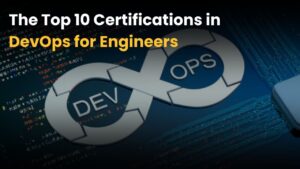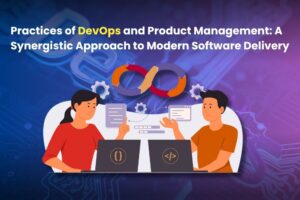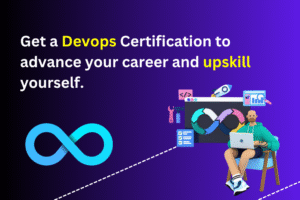In today’s fast-paced digital landscape, DevOps has become an integral part of IT strategy for many organizations. DevOps is a set of practices that combines software development (Dev) with IT operations (Ops) to provide continuous delivery of high-quality software while shortening the development lifecycle. The need for qualified DevOps specialists is growing as more businesses use DevOps approaches to boost productivity and creativity. In this article, we explore the top five industry-demanded DevOps job roles, providing a comprehensive look at their responsibilities, required skills, and career prospects.
An existing software development process is the foundation upon which a DevOps team is established. DevOps manages the complete software development and deployment process; often, the person at the top must oversee the entire team, which includes both technical and non-technical staff. Despite the fact that there is no one perfect technique to deploy DevOps, each firm does so in accordance with its own requirements. However, the goal of practically every DevOps installation is to automate the entire process as much as feasible. Some of the DevOps job roles, together with their essential duties and required abilities, are listed below.
DevOps Engineer
Overview:
One of the most sought-after positions in the DevOps field is that of DevOps Engineer. These professionals act as the bridge between development and operations, ensuring the seamless integration, deployment, and delivery of software systems.
Key Responsibilities:
- Automating infrastructure, deployment, and configuration management
- Building and maintaining CI/CD pipelines
- Monitoring and logging system performance
- Ensuring system security and compliance
- Working together to supervise code releases with developers and IT personnel
Required Skills:
- Proficiency with CI/CD systems like Jenkins, GitLab CI, or CircleCI
- Knowledge of configuration management programs such as Chef, Ansible, or Puppet
- Expertise in cloud platforms (AWS, Azure, GCP) and programming languages such as Python, Bash, or Ruby
- Knowledge of containerization technologies like Docker and orchestration systems like Kubernetes
Career Prospects:
DevOps engineers enjoy high demand across industries, with lucrative salary packages. They frequently move into positions such as DevOps Architect, Site Reliability Engineer (SRE), or Senior DevOps Engineer.
Site Reliability Engineer (SRE)
Overview:
The performance, scalability, and dependability of systems are the responsibility of Site Reliability Engineers (SREs). This role, originally developed by Google, combines software engineering with IT operations.
Key Responsibilities:
- Designing and implementing automation to improve system reliability
- Monitoring application performance and availability
- Conducting root cause analysis for system failures
- Managing incident response and disaster recovery
- Implementing service-level objectives (SLOs) and service-level agreements (SLAs)
Required Skills:
- Strong programming skills in languages like Go, Java, or Python
- Knowledge of observability technologies, such as Grafana, Prometheus, and the ELK stack
- Deep understanding of networking, system internals, and cloud infrastructure
- Become familiar with incident management tools and practices
- Knowledge of CI/CD and configuration management tools
Career Prospects:
SREs are in great demand due to their ability to maintain high service availability. Career growth can lead to roles like Principal SRE, SRE Manager, or Technical Architect.
Cloud DevOps Engineer
Overview:
A cloud DevOps engineer specializes in leveraging cloud technologies to implement DevOps practices. They create and oversee cloud-based infrastructure, making sure it facilitates quick deployment and agile development.
Key Responsibilities:
- Designing and deploying scalable cloud infrastructure
- Implementing CI/CD pipelines in the cloud
- Ensuring cloud security and compliance
- Automating cloud resource provisioning and configuration
- Monitoring and optimizing cloud performance
Required Skills:
- In-depth knowledge of cloud platforms (AWS, Azure, GCP)
- Knowledge of serverless computing and container orchestration
- Knowledge of Infrastructure as Code (IaC) tools, such as Terraform
- CloudFormation, understanding of cloud networking, access control, and identification
- Knowledge of cloud-native logging and monitoring systems
Career Prospects:
Cloud DevOps engineers are essential for organizations moving to the cloud. Career options include positions like cloud solutions engineer, cloud architect, and DevOps consultant.
To become an expert in DevOps, check out the DevOps Training in Pune course
Release Manager
Overview:
Release managers oversee the entire software release process, ensuring that new software versions are delivered efficiently and without disruption. They serve as liaisons between the operations, testing, and development teams.
Key Responsibilities:
- Planning and managing software releases
- Coordinating release schedules and activities
- Ensuring release readiness across teams
- Managing risks and resolving issues related to releases
- Maintaining release documentation and compliance
Required Skills:
- Strong project management and organizational skills
- Become familiar with release management tools (Jira, ServiceNow, Azure DevOps)
- Understanding of software development lifecycle (SDLC)
- Knowledge of CI/CD processes and tools
- Effective communication and collaboration abilities
Career Prospects:
Release managers are crucial in regulated industries like finance and healthcare. They may progress to roles like Senior Release Manager, Program Manager, or DevOps Program Lead.
Automation Engineer
Overview:
Automation engineers in DevOps focus on creating and maintaining scripts and tools to automate repetitive tasks, improving efficiency and reducing human error in software development and operations.
Key Responsibilities:
- Developing automation scripts for deployment, configuration, and monitoring
- Implementing automated testing frameworks
- Ensuring automated workflows align with DevOps best practices
- Troubleshooting and maintaining automation tools
- Collaborating with development and QA teams
Required Skills:
- Proficiency in scripting/programming languages (Python, Shell, PowerShell)
- Experience with automation tools (Selenium, Jenkins, Ansible)
- Knowledge of software testing methodologies
- Become familiar with version control and CI/CD systems
- Understanding of cloud and container technologies
Career Prospects:
Automation engineers can evolve into roles such as DevOps Lead, QA Automation Architect, or Systems Architect, contributing to the broader DevOps strategy.
Conclusion
Professionals with the appropriate abilities and attitudes will find intriguing possibilities in the dynamic and changing DevOps sector. Whether you’re a software engineer looking to transition into DevOps or an IT operations professional aiming to enhance your expertise, these top five DevOps roles offer promising career paths with substantial growth potential. By investing in the necessary skills and staying current with industry trends, you can position yourself at the forefront of this transformative field.






